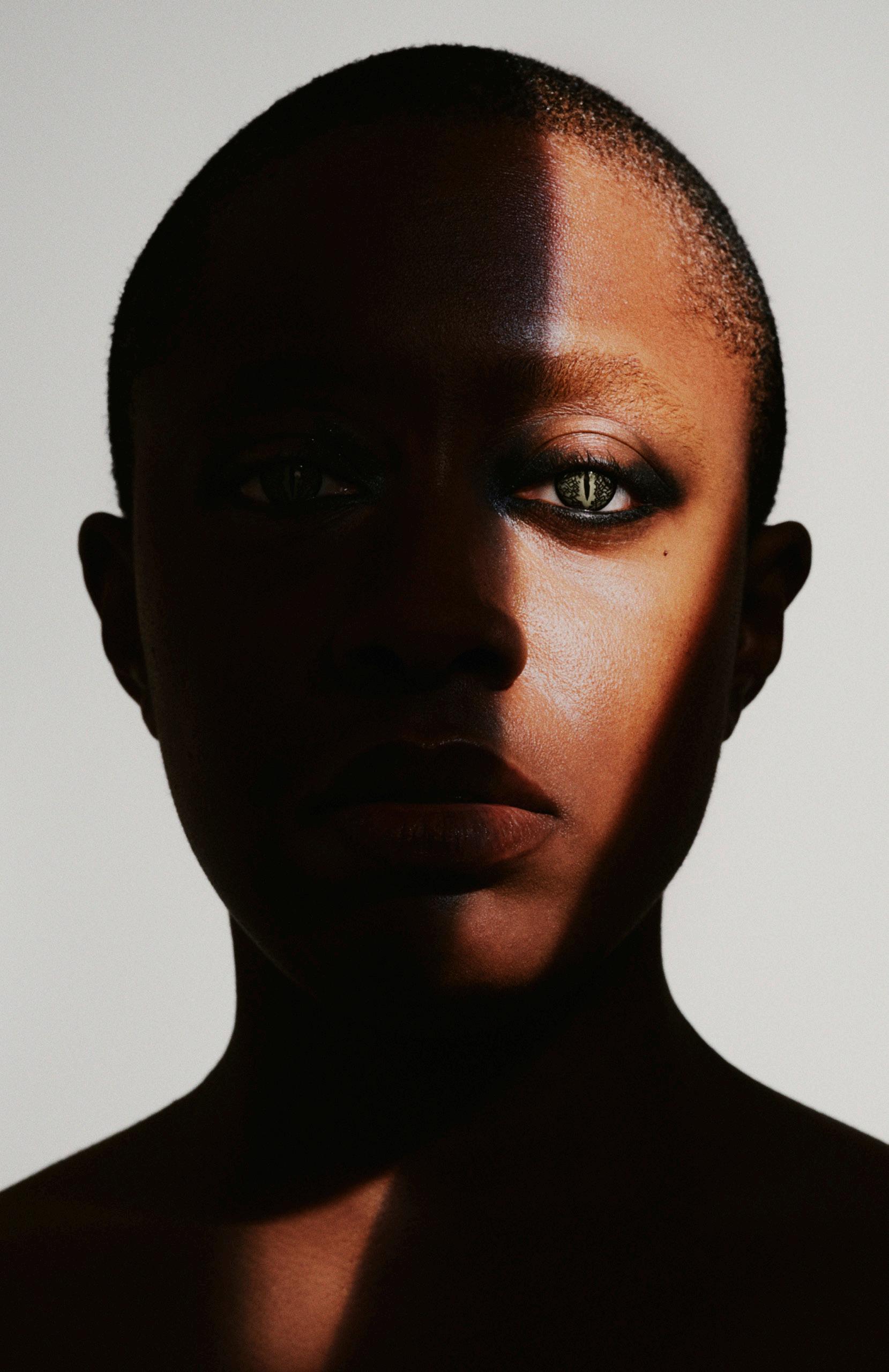KRONOS QUARTET WITH PENI CANDRA RINI
March 21, 2025 | 7:30 PM
Camp Concert Hall
PRE-CONCERT ARTIST TALK AT 6:30 PM



March 21, 2025 | 7:30 PM
Camp Concert Hall
PRE-CONCERT ARTIST TALK AT 6:30 PM


IS MADE POSSIBLE IN PART BY THE GENEROUS SUPPORT OF Dewitt Fund for the Arts
Louis S. Booth Arts Fund
H. G. Quigg Fund
A. Dale Mayo Fund
THANKS TO OUR 2024-25 MODLIN ARTS PRESENTS SEASON SPONSORS & COMMUNITY PARTNERS
E. Rhodes and Leona B. Carpenter Foundation
Virginia B. Modlin Endowment
Tucker-Boatwright Festival
Norman and Eleanor Leahy
William and Pamela O'Connor




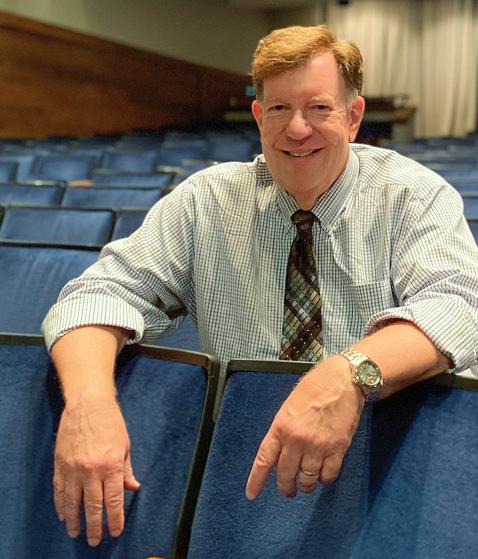
At Modlin Center for the Arts, we are committed to providing the University of Richmond campus and our broader community with the best in diverse, thoughtprovoking, and captivating performances. Each season is cultivated with our attention to showcasing artists who provide insight into our shared humanity. At the University of Richmond, we pledge to you—our patrons and partners, on campus and in our region—that the arts will provide broad access to rich voices, creative passion, and unforgettable experiences.

Paul Brohan, Executive Director

P Ticketed: Paid
F Free: Tickets Required
F Free: No Tickets Required
Modlin Arts Presents
Department of Theatre and Dance
Department of Music
World Premier
Modlin Commission
BODYTRAFFIC
Fri 24 Jan 7:30pm
February
Manual Cinema, Frankenstein Sat 1 Feb 7:30pm
Lab Project: The Woman in Black Thu-Sat 6-8 Feb 7:30pm Sun 9 Feb 2pm
Billy Childs Quartet with Sean Jones, The Winds of Change Fri 7 Feb 7:30pm
Leyla McCalla Thu 13 Feb 7:30pm
Third Coast Percussion with Salar Nader Fri 21 Feb 7:30pm
University Dancers 40th Anniversary Concert
Fri-Sat 28 Feb-1 Mar 7:30pm Sun 2 Mar 2pm
Doris Wylee-Becker, piano
Sun 2 Mar 3pm
Anzû Quartet
Wed 5 Mar 7:30pm
Documentary Film
Screening: The Sound of Santiago by Dr. Mike Davison and Ed Tillett
Thu 6 Mar 7:30pm
Kronos Quartet with Peni Candra Rini
Fri 21 Mar 7:30pm
Tanya Tagaq
Thu 27 Mar 7:30pm
Neumann Lecture on Music: Robert Fink
Mon 31 Mar 7:30pm
Twyla Tharp Dance with Third Coast Percussion Sat 5 Apr 7:30pm
Global Sounds Sun 6 Apr 3pm
Jazz & Contemporary Combos
Wed 9 Apr 7:30pm
Simone Dinnerstein, piano
Fri 11 Apr 7:30pm
Spring Choral Concert
Sun 13 Apr 3pm
Wind Ensemble
Mon 14 Apr 7:30pm
Popular Music Ensemble
Tue 15 Apr 7:30pm
Urinetown
Thu-Sat 17-19 Apr 7:30pm Sun 20 Apr 2pm
Chamber Ensembles
Mon 21 Apr 7:30pm
University Symphony Orchestra
Wed 23 Apr 7:30pm
Cuban Spectacular: From Mambo to Motown Thu 24 Apr 7:30pm
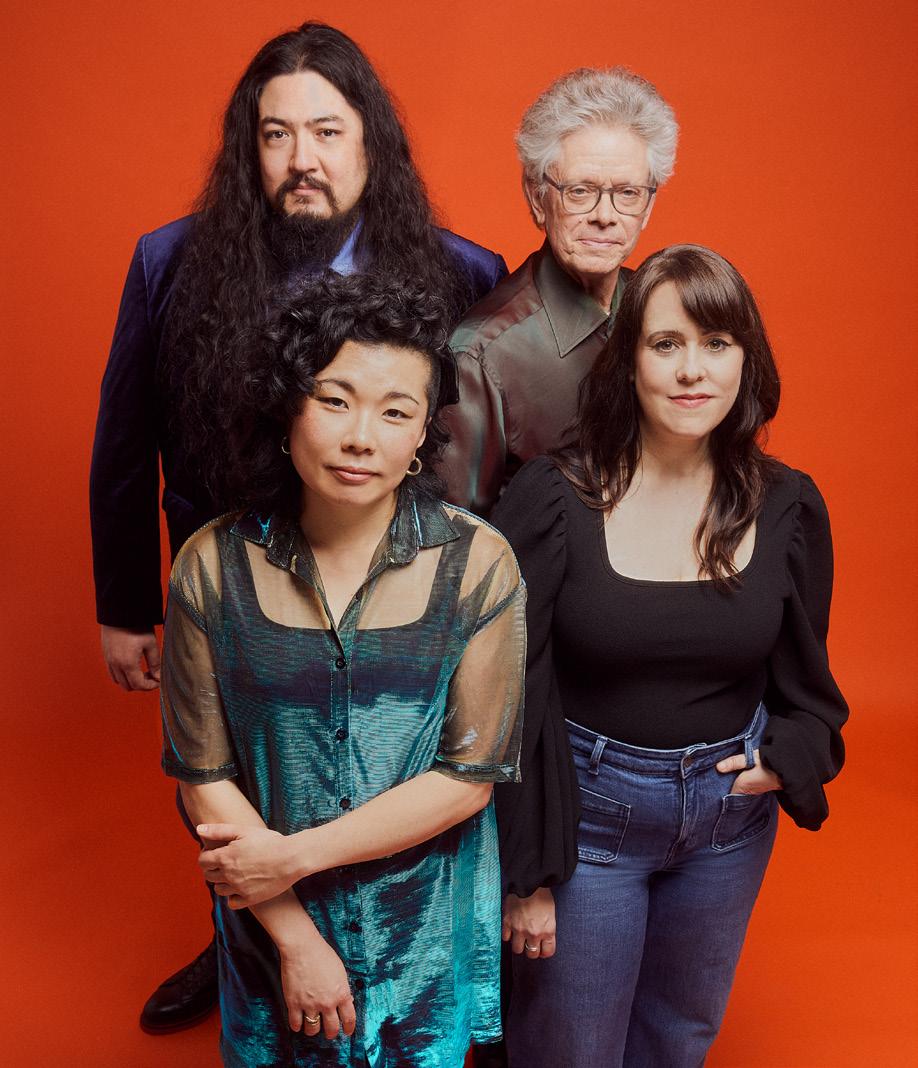
KRONOS QUARTET
David Harrington, violin
Gabriela Díaz, violin
Ayane Kozasa, viola
Paul Wiancko, cello
With special guest Peni Candra Rini
Brian H. Scott, Lighting Designer
Scott Fraser, Sound Designer
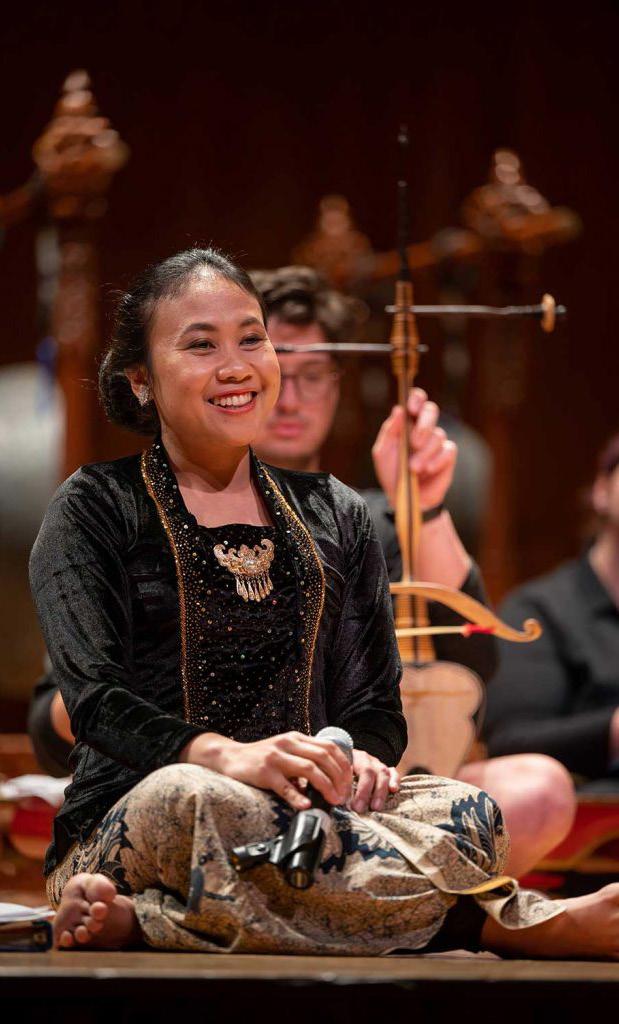
Join us at 6:30 PM for a pre-performance discussion with members of Kronos Quartet, moderated by VPM Music Classical Host Mike Goldberg.
This evening’s performance will last approximately 2 hours, including a 20-minute intermission.
For full program notes, including composer biographies, scan one of the QR codes in the lobby.
PROGRAM
Outer Spaceways Incorporated + (arr. 2023) Sun Ra (arr. Jacob Garchik)
Gold Came From Space * (2023) Aleksandra Vrebalov
Cadenza on the Night Plain * (1984) Terry Riley
Introduction
Cadenza: Violin I
Where Was Wisdom When We Went West?
Cadenza: Viola
March of the Old Timers Reefer Division
The Old Timers Throw a Spring Festival
Marching Off to More Serious Matters
Cadenza: Violin II
Tuning to Rolling Thunder
The Night Cry of Black Buffalo Woman
Cadenza: Cello
Gathering of the Spiral Clan
Captain Jack Has the Last Word
INTERMISSION
Maduswara ** (2020) Peni Candra Rini (arr. Jacob Garchik)
with special guest Peni Candra Rini, vocals
Segara Gunung * (2023) Peni Candra Rini (arr. Jacob Garchik & Andy McGraw)
I. Segara Gunung
II. Agni
III. Ketiga Dawa
IV. Hujan
with special guest Peni Candra Rini, vocals, gender
I Gusti Putu Sudarta, shadow master
Andy McGraw, gamelan and shadow theatre
Doro (Azif Azizi), shadow theatre assistant
Ma Chen Ni, shadow theatre assistant
* Written for Kronos
** Written for Kronos Fifty for the Future
+ Arranged for Kronos
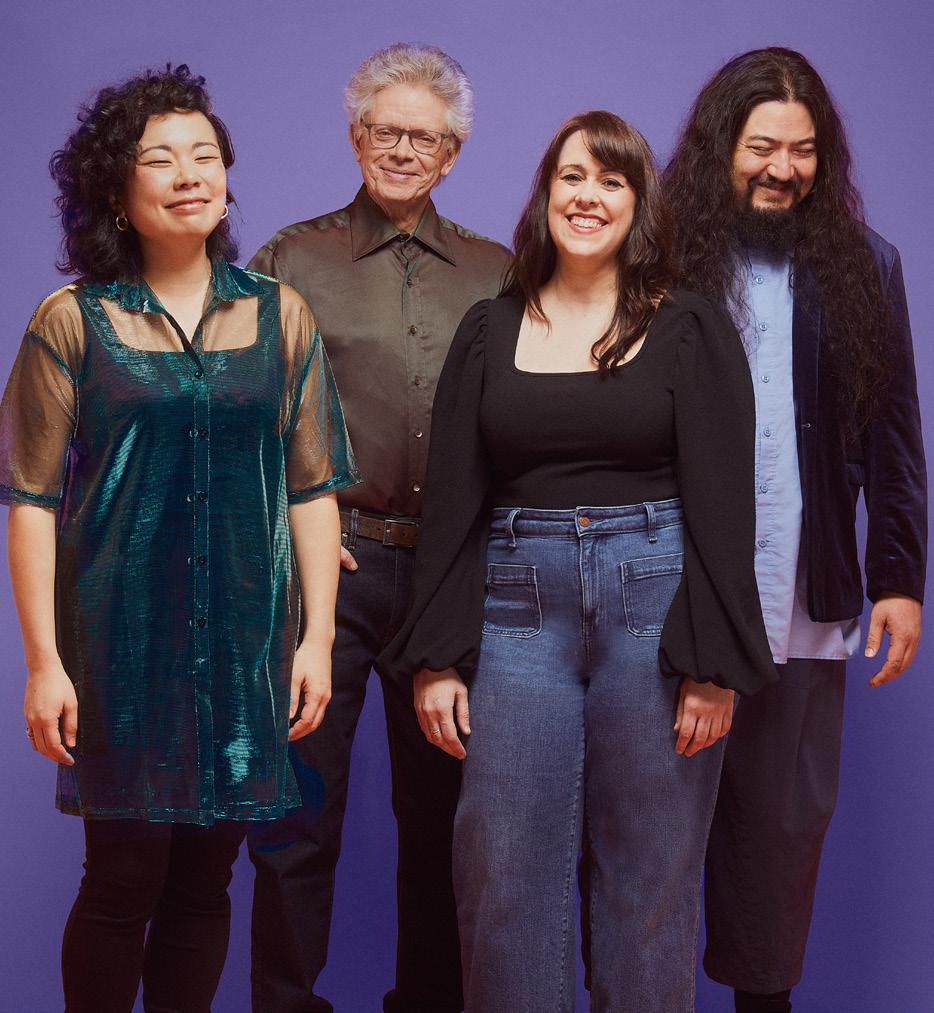
For over 50 years, San Francisco’s Kronos Quartet has reimagined what the string quartet experience can be. One of the most celebrated and influential groups of our era, Kronos has given thousands of concerts worldwide, released more than 70 recordings, and collaborated with many of the world’s most accomplished composers and performers across many genres. Through its nonprofit organization, Kronos Performing Arts Association (KPAA), Kronos has commissioned more than 1,100 works and arrangements for quartet. Kronos has received more than 40 awards, including three Grammy Awards and the Polar Music, Avery Fisher, and Edison Klassiek Oeuvre Prizes.
Integral to Kronos’ work is a series of long-running commissioning collaborations with hundreds of composers worldwide, including Terry Riley (Salome Dances for Peace, Sun Rings); Aleksandra Vrebalov (Pannonia Boundless, Beyond Zero); Tanya Tagaq (Nunavut, Sivunittinni); Philip Glass (String Quartets No. 6 and No. 7); Fodé Lassana Diabaté (Sunjata’s Time); and Steve Reich (Different Trains, WTC 9/11).
In its most ambitious commissioning effort to date, KPAA has recently completed a monumental education project, Kronos Fifty for the Future. Through this initiative, supported by Lead Partner Carnegie Hall and a robust coalition of other partners, Kronos has commissioned—and distributed online for free—50 new works for string quartet designed for students and emerging professionals, written by composers from around the world. Kronos has also mentored emerging musicians through workshops or extended residencies with institutions such as Carnegie Hall’s Weill Music Institute (New York), San Francisco Conservatory of Music, the Royal Conservatory of Music (Toronto), Holland Festival (Amsterdam), and New York University Abu Dhabi.
In recordings, Kronos has collaborated with artists including Chinese pipa virtuoso Wu Man, Indian tabla virtuoso Zakir Hussain, legendary Bollywood “playback singer” Asha Bhosle, Iranian vocalist Mahsa Vahdat, industrial rock band Nine Inch Nails, and the Malian Trio Da Kali. Kronos has performed live with the likes of Paul McCartney, Allen Ginsberg, Rokia Traoré, David Bowie, Rhiannon Giddens, Caetano Veloso, and The National, among many others. In dance, famed choreographers such as Merce Cunningham, Twyla Tharp, and Alonzo King have set work to Kronos’ music.
The quartet tours for several months each year, appearing in celebrated venues and festivals including Carnegie Hall, BRIC Celebrate Brooklyn!, and BAM Next Wave Festival in New York; Big Ears in Knoxville, Tennessee; Palacio de Bellas Artes in Mexico City; the Barbican in London; the Muziekgebouw in Amsterdam; Shanghai Concert Hall; Suntory Hall in Tokyo; and the Sydney Opera House.
Kronos’ expansive discography on Nonesuch includes three Grammywinning albums—Terry Riley’s Sun Rings (2019), Landfall with Laurie Anderson (2018), and Alban Berg’s Lyric Suite (2003)—along with dozens of other acclaimed releases. Kronos’ recent recordings include Songs and Symphoniques: The Music of Moondog (2023), a collaboration between Kronos and the Ghost Train Orchestra revisiting Moondog’s vital and uplifting music for a new generation, and My Lai (2022), an opera by Jonathan Berger (music) and Harriet Scott Chessman (libretto).
Kronos’ work has featured prominently in many films, including A Thousand Thoughts, a “live documentary” that tells the story of Kronos’ career through live music, narration, and film. Written and directed by Sam Green and Joe Bini, the work premiered at the Sundance Film Festival in 2018. Most recently, the quartet performed on the soundtrack for Users (2021) and is both seen and heard in the documentary Zappa (2020).
Based in San Francisco, the nonprofit KPAA staff manages all aspects of Kronos’ work, including commissioning, concert tours and local performances, recordings, education programs, and an annual Kronos Festival in San Francisco.
Peni Candra Rini is the daughter of a master puppeteer from East Java, Indonesia, and one of few female contemporary composers, songwriters, poets, and vocalists who performs sinden, a soloist-female style of gamelan singing. Strongly committed to preserving and sharing the musical traditions of her country, Candra Rini has created many musical compositions for vocals, gamelan, and karawitan, and has collaborated with various artists
worldwide, including Katsura Kan, Noriko Omura, Aki Bando, Kiyoko Yamamoto (JP), Found Sound Nation New York, Elena Moon Park (USA), Ali Tekbas (Turkey), Mehdi Nassouli (Morocco), Asma Ghanem (Palestine), Rodrigo Parejo (Spain), among many others.
Candra Rini has collaborated with various gamelan groups from all over the world, and has performed at major festivals including Mascot SIPA Solo International Performing Arts 2016, TEDx Ubud 2019, Big Ears Festival 2019, Mapping Melbourne 2018 Multicultural Art Festival, International Gamelan Festival 2018 Surakarta, Indonesian Tong-Festival Festival 2018 in The Hague, Holland Festival 2017, WOMADelaide festival 2014 in Adelaide, Spoleto Dei Duo Mondi Festival 2013, and Lincoln Center White Light Festival 2011. Her recorded albums include Ayom (2019), Timur (2018), Agni (2017), Mahabharata - Kurusetra War (2016), Daughter of the Ocean (2016), Bhumi (2015), Sekar (2012), and Bramara (2010).

In 2012, Candra Rini completed an artist residency at the California Art Institute with funding from the Asian Cultural Council. During that time, she appeared as a guest artist at eight American universities and participated in master classes with vocal master Meredith Monk. In addition to this extensive work as a performer, Candra Rini is also a lecturer in the Karawitan Department, an Aga Khan Laureate, and a former Fulbright Scholar. In 2021, she earned a doctorate in Musical Arts from the Indonesian Art Institute (ISI) in Surakarta.
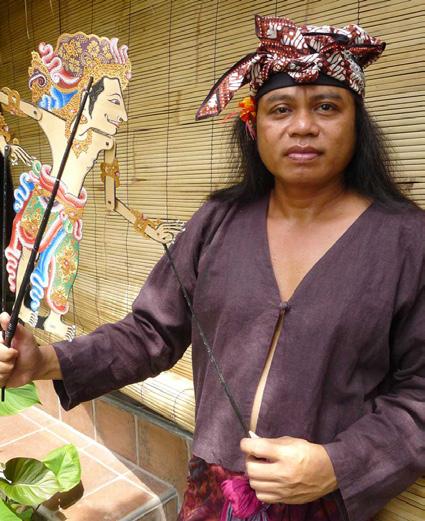
Dr. I Gusti Putu Sudarta, PhD (shadow master, b. 1968) was born into a family of artists in the village of Bedulu, Bali. From a young age, he was familiar with traditional Balinese gamelan music studying with teachers in his village. At the age of nine, Sudarta began to study the challenging music of the Balinese shadow play with several master artists. Later he began to study the arts of the shadow master (dalang). After completing his undergraduate studies in shadow theatre at the Indonesian Institute of the Arts in Bali in 1990, Sudarta was appointed as a lecturer in the Department of Puppetry at the Institute. In 2018 he completed his Phd in theater at the Indonesian Institute of the Arts in Surakarta.
Sudarta is a prolific musician, dancer, composer, and shadow master, actively
performing at Balinese temple rituals, in academic contexts, at national cultural festivals, and on international stages. He has taught frequently as a visiting artist at the University of Richmond and co-founded its community gamelan ensemble, Gamelan Raga Kusuma.
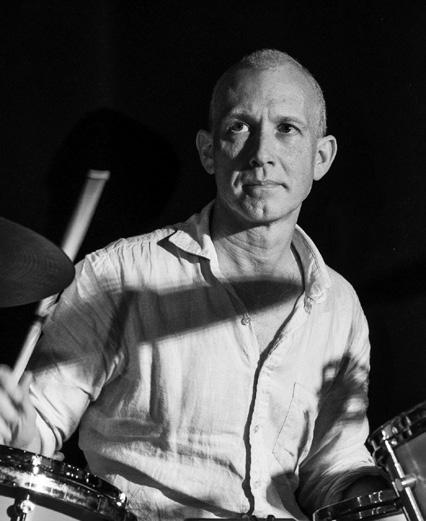
Dr. Andy McGraw, PhD (gamelan, shadow theatre, b. 1974) is Professor and Chair of the Department of Music at the University of Richmond in Virginia. He is the author of Radical Traditions: Reimagining Culture in Balinese Experimental Music (Oxford 2013) and Music as Ethics (Oxford 2023). He has co-edited two volumes on Indonesian music: Performing Indonesia, with Sumarsam (Smithsonian 2014) and Sounding Out the State of Indonesian Music, with Chris Miller (Cornell 2022). He has published numerous articles on music and ethics as well as analytical pieces on rhythm in Balinese, Javanese, and Cuban musics. In Richmond he facilitates community gamelan and stringband ensembles and runs a music program in the Virginia prison system. His research, teaching, and creative work has been supported by multiple Fulbright grants, the National Endowment for the Humanities, Arts International, the Smithsonian, and the Indonesian Department of Culture, among other organizations. Since 1996 he has spent years studying, teaching, and performing in Indonesia, collaborating with leading composers and performers in Bali and Java. His discography includes recordings on Sargasso, Porter, Tzadik, Out of Your Head, and New Amsterdam record labels.
Doro (Azif Azizi) (shadow theatre assistant) is a senior at the University of Richmond majoring in Interdisciplinary Studies. Originally from Kuala Lumpur, Malaysia, Doro counts themselves lucky to have been a student to all three of the artistprofessors above. Doro is an aspiring theater maker, with recent credits including assistant director for Stop Kiss and producing, writing and performing an original solo piece, Denganmu Ibu // Debu.
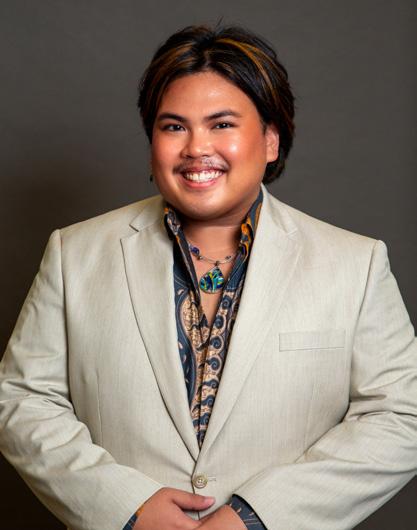
Ma Chen Ni (shadow theatre assistant) was born in Taipei in 1960 and was raised in Java. In 1980 she returned to Taiwan to work in theater production and organizing festivals, music concerts, and cultural performances. In 2000 she moved to Bali as an assistant to Gusti Putu Sudarta, and as a producer at Bajrajnyana Music Theater.
Sun Ra (1914-1993)
Outer Spaceways Incorporated (arr. 2023)
Arranged by Jacob Garchik (b. 1976)
Sun Ra, who enjoyed cloaking his origins and development in mystery, is known to have studied piano early on with Lula Randolph in Washington, DC. His first noted professional job was during 1946-47 as pianist with the Fletcher Henderson Orchestra at the Club DeLisa on the South Side of Chicago. In addition to playing piano in the band he also served as one of the staff arrangers. Finding his calling as an arranger, he put together a band to play his compositions. In the 1950s, he began issuing recordings of his unusual music on his Saturn label, becoming one of the first jazz musicians to record and sell his own albums. Sun Ra’s band became a central part of the early avant-garde jazz movement in Chicago, being one of the first jazz bands to employ electronic instruments. In 1960, he moved his band to New York, where he established a communal home for his musicians, known as the Sun Palace, and by 1970s, the Sun Ra Arkestra and its various permutations began touring Europe extensively. An outsider who linked the African-American experience with ancient Egyptian mythology and outer space, Sun Ra was years ahead of all other avant-garde musicians in his experimentation with sound and instruments, a pioneer in group improvisations and the use of electric instruments in jazz.
Jacob Garchik, multi-instrumentalist and composer, was born in San Francisco and has lived in New York since 1994. At home in a wide variety of styles and musical roles, he is a vital part of the Downtown and Brooklyn scene, playing trombone in groups ranging from jazz to contemporary classical to Balkan brass bands. He has released 5 albums as a leader, including The Heavens: the Atheist Gospel Trombone Album. He coleads Brooklyn’s premiere Mexican brass band, Banda de los Muertos. As a trombonist Jacob has worked with many luminaries of jazz and the avant-garde, including Henry Threadgill, Steve Swallow, Lee Konitz, Laurie Anderson, Anthony Braxton, and George Lewis. In 2018 he won the “Rising Star – Trombone” category in the Downbeat Jazz Critic’s Poll. Jacob also plays accordion, tenor horn, and tuba.
About Outer Spacways Incorporated, Jacob Garchik writes:
“Sun Ra recorded Outer Spaceways Incorporated many times. To create this arrangement, I listened to as many renditions as I could find—abstracted solo piano concerts, instrumental Arkestra odysseys with long, freely improvised
introductions, electro-acoustic versions, and the swinging version with June Tyson singing that appears in the film Space is the Place. In place of the often raucous solo section that followed the vocal versem, I made a little ‘shout chorus’ for Kronos that tried to capture the time-traveling feeling of Sun Ra; that you are listening to music that exists in past, present, and future all at once.”
This remix was created for the Red Hot + Ra series—a large-scale, multialbum multimedia series featuring many artists offering their interpretations of and tributes to the music of Sun Ra. Illustrating Sun Ra’s profound influence on contemporary culture around the world, the series also aims to raise awareness about climate justice. Outer Spaceways Incorporated is part of the Red Hot + Ra album curated by Kronos’ David Harrington, released in 2024.
Aleksandra Vrebalov (b. 1970) Gold Came From Space (2023)
The 2024 Grawemeyer Music Prize recipient Aleksandra Vrebalov defines her work as an opportunity for healing, service, connection, and a celebration of humanness. Her 100+ works, diverse in aesthetics, genre, and medium, are often inspired by urgent personal concerns and explore themes of identity, place, and belonging.
Living through the wars in former Yugoslavia, Vrebalov has been inspired by the friction between the public and the private side of heroism—like in Beyond Zero: 1914-1918, the 2014 multimedia collaboration with Kronos, or her opera The Knock.
Vrebalov’s works—ranging from concert music and opera to music for modern dance and film—have been performed by the Kronos Quartet, Cincinnati and Glimmerglass Opera, Serbian National Theater, English National Ballet, Rambert Dance, Sybarite5, Gottinger Symphonie, ETHEL, Dusan Tynek Dance Company, Ijsbreker, Moravian Philharmonic, Belgrade Philharmonic, and Providence Festival Ballet, among others. Her works have been recorded for Nonesuch, Cantaloupe, Innova, Centaur Records, Vienna Modern Masters, and Ikarus Films.
About Gold Came From Space, Aleksandra Vrebalov writes:
“Gold Came From Space — a meditation on the beauty and purity of soul incorruptible by earthly dealings and on the nobleness of work guided by love and truth — is a singular journey driven by curiosity, passions,
memories, and exploration of my deep creative connection to Kronos Quartet and our place as creators who together crossed over from the XX into the XXI century.
“The dramatic narrative of the piece is abstract and distorted with islands of harmonic and melodic grounding. The piece unfolds through the juxtaposition of contrasting, extreme qualities of musical parameters: rhythm is amorphous and driven, harmony emerges from and dissolves into noise, the texture vacillates between sparse and dense, and fragmented circular patterns—timestoppers—propel into linear cohesion. The overall structure follows 17 harmonics descending towards the mothertone, and 17 turns of the spiral in the Fibonnaci sequence spiraling down to 1. The piece, much like nature, follows the contours of these phenomena, but it never conforms to their theoretical precision.
“Sporadic references to a chord, a pattern, or a line from The Sea Ranch Songs, Beyond Zero 1914-1918, and ilektrikés rhimés do not sound like quotes; they form the fabric of a new context, celebrating where we—Kronos and I— have musically come from over 25 years of collaboration.
“Gold Came From Space is a space of gathering of old friends, an imaginary session of philosophers and alchemists, a picture a little diffused and out of focus whose image slowly gets revealed as the eye adjusts.
“My purpose - to create beauty, and to create it with others, for ourselves and for others, for the world to be more loving and wonder-full, has been fulfilled many times with Kronos, as well as with The Friends of Kronos at The Sea Ranch who commissioned this work. I am immensely grateful for it.”
Aleksandra Vrebalov’s Gold Came From Space was commissioned for the Kronos Quartet by The Friends of Kronos at The Sea Ranch, as part of the KRONOS Five Decades Project, which celebrates the quartet’s 50th anniversary.
Terry Riley (b. 1935)
Cadenza on the Night Plain (1984)
Terry Riley, who studied composition at the University of California at Berkeley, first came to prominence in 1964 when he found a way to subvert the world of tightly organized atonal composition then in academic fashion. With the groundbreaking In C—a work built upon steady pulse throughout; short, simple repeated melodic motives; and static harmonies—Riley achieved an elegant and non-nostalgic return to tonality in art music. He
demonstrated the hypnotic allure of making complex musical patterns out of basic means. And in so doing, he produced the seminal work of the now popular Minimal school.
Born in the Sierra Nevada mountains of Northern California, where he still lives and composes amidst surroundings of striking natural beauty and spectacular night skies, Riley developed pattern music in response to his love for such natural design. But his facility for complex pattern making also proved the product of his virtuosity as a keyboard improviser. Riley quit formal composition altogether following In C in order to concentrate on improvisation, and in the late ‘60’s and early 70’s, he built a reputation for weaving dazzlingly intricate skeins of music during all-night improvisations on organ and synthesizer.
Also in the early 70’s, Riley began to devote himself to the study of North Indian vocal techniques under the guidance of the legendary Pandit Pran Nath, and a new element gradually entered his music: long-limbed melody. From his work in Indian music, moreover, he also developed an interest in the subtle distinctions of tuning that would be hard to achieve with a traditional classical ensemble.
Riley decided to notate music again in 1979 when both he and the Kronos Quartet were on the faculty at Mills College in Oakland. By collaborating extensively with Kronos, with whom he soon developed a close relationship, Riley began to discover the degree to which his various musical passions could be integrated, not as pastiche, but as different sides of similar musical impulses that still maintained something of the oral performing traditions of India and jazz. Riley began to consider the string quartet in general, and the Kronos Quartet in particular, as the ideal medium for his evolving musical language. And that meant approaching the string quartet in an entirely new way.
Riley’s first quartets were inspired by his keyboard improvisations, but his knowledge of string quartets became more sophisticated through his work with Kronos, and as Kronos became more comfortable with the breadth of Riley’s musical world, he was able to combine rigorous compositional ideas with his more performance-oriented approach to music making. But Riley’s quartets were also examples of his devotion to music as a spiritual endeavor. A gentle and wise man, Riley has an oracular presence. Storytelling is among his gifts, and like his music, Riley’s stories are cross-cultural.
Cadenza on the Night Plain is grand in scope, having something of the cosmic quality of a raga. It is a work that combines a minimalist’s love for
repeated figuration with Riley’s Indian-trained ability to develop a piece over substantial time periods. It is dramatically evocative, programmatic, philosophical and folksy at the same time. Although not written in direct collaboration with Kronos, Cadenza is, nonetheless, a specific response to the members of the quartet, and it contains a cadenza for each player that reflects some aspects of his or her personality.
In Cadenza, Riley goes further than he had in previous quartets in exploring the spiritual quality of various tunings. The titles of the separate movements sometimes refer to the composer’s personal fantasies and sometimes are philosophical or humorously indicated in the music. The reefer division, for instance, refers to old, veteran hippies off to save the world, and they are portrayed with a sort of Ivesian humor in a 10/4 march—as if the stoned old timers all had two left feet.
But Cadenza is primarily a work of profound spirituality. The achingly lyric, canonically flowing Where Was Wisdom When We Went West? represents Riley’s interest in Western spirituality. The movement recalls the unenlightened aspects of the pattern of Western migration over the last several hundred years. In the consoling Tuning to Rolling Thunder, Riley uses an expressive musical tuning to tune-in to the ideas of Rolling Thunder, a medicine man in Nevada.
In the end, Cadenza is about balance, and the balance of spirit which should be able to soar ecstatically, while remaining connected to the simplest human pleasures. Riley’s homey vision of sonic utopia is a kaleidoscopic balance of musics. Naive ideas become transformed, Bach-like, into the transcendental without losing their innocence in the process.
Program note by Mark Swed
Cadenza on the Night Plain was commissioned by the Kronos Quartet, Hessischer Rundfunk (Radio Frankfurt), and Gramavision Records. The work is dedicated to the late Dr. Margaret Lyon, former chair of the music department at Mills College in Oakland, where the composer taught for more than a decade.
Peni Candra Rini (b. 1983)
Maduswara (2020)
Arranged by Jacob Garchik (b. 1976)
About Maduswara, Peni Candra Rini writes:
“Javanese society’s consideration of what is in vogue has changed, and the decline of appreciation in the traditional arts has had a major impact on the existence of the female Javanese singer (sindhen); it has impacted both the singer and the audience. Today’s listeners of karawitan has become accustomed to the phenomena of nggantung rebab, which is found in the coasts of island Java far from the palaces (keraton). The phenomena of nggantung rebab is when people expect karawitan concerts to offer musical pieces (gending) with hard rhythms, songs that follow a fast tempo like those found in discotheques where visitors get drunk. The rebab is a subtle and old-fashioned instrument and is beginning to be eliminated, reflecting the move away from more delicate presentation gending. The impact is a generational gap where younger singers feel they do not need to study the classical vocabulary because it is rarely used.
“This discourse continues in contemporary karawitan, as found in campursari music, which plays the melodies of karawitan with MIDI instruments and electric keyboards. This is because those instruments are very practical, easy to carry, and also cheaper than a gamelan set. Campursari dominated the scene in the 90s and 2000s, pioneered by the late Manthous through CSGK (Campur Sari Gunung Kidul), and many commercial recordings were made and sold during that time. But many believe that campursari fails to represent the classical gamelan repertoire. Out of campursari came a generation of pesinden who were considered to have below average singing ability because the sound they produced were discordant in tone to and not in accordance with the rules of Javanese gamelan. Because of this, sindhen singing campursari are not taken seriously in art schools, a serious problem considering diversity is already lacking in those schools.
“The emergence of social media has given pesindhen access to selfpromotion, which the singers now readily use. But what appears on social media often does not represent real life, and are not true achievements or true representations of the singer’s abilities. Sindhen now have the added pressure of celebrity culture, and are adored for beauty and ability to dance on stage, with flawless make-up and frenzied lights, and her duties as a singer and orator of the poetry of life takes second fiddle.
“Maduswara was arranged to encourage this generation of pesindhen to realize their duty as the conveyor of the universal values of life because, whether they are aware or not, these artists shape the spirit of the nation.”
Launched in the 2015/16 season, Kronos Fifty for the Future is an education and legacy project that has commissioned—and distributed for free—the first learning library of contemporary repertoire for string
quartet. Fifty new works have been commissioned, and scores and parts, as well as supplemental learning materials that include recordings, videos, performance notes, and composer interviews, are available on kronosquartet.org.
Peni Candra Rini (b. 1983)
Segara Gunung (2023)
Arranged by Jacob Garchik (b. 1976) and Andy McGraw (b. 1974)
About Segara Gunung, Peni Candra Rini writes:
“This music is about the mountains and the sea, and the respect we have for them in Indonesia. Mountains symbolize the unity of humans and the divine and are thought to be the abode of the Gods. The sea is a woman, the spring of springs and a source of all life.
“Indonesia is also a ring of fire, encircled by active volcanoes and frequently shaken by earthquakes. The mountain brings both destruction and life. The ash from frequent eruptions has created some of the most fertile soil in the world. Villages are damaged by the eruptions but then reap the boon of the harvest.
“But the traditional respect and reverence of the land and sea has eroded in my country—in your country—pushed aside by greed. Mountains become the backdrop for tourist photos and tourism erodes the environment. Waters are rising, washing villages into the sea. Ultimately, we must remember that mother earth will clean house: burning us up and washing us clean. Ready or not. Segara Gunung is my response to these changes.
“As a tropical nation, rain holds a special place in the childhood memories of all Indonesians. Rain is honored as a celebration of growth, returning buds to the tips of dry branches. Thunder and lightning inspire awe, alongside the joy of refreshing showers. The earth responds with the delicious aroma of water hitting parched soil and the perfume of flowers bursting in bloom, shaking off their withered leaves. Our childhood memories of rain are suffused with a sense of hope and rebirth.
“But now those joyful childhood memories are being replaced by an unsettling fear. Our rhythm of monsoon and dry season have become irregular and unpredictable. Rains come with such force they wash away villages, like a never-ending sobbing, eroding hope. Nostalgia and fear transform into a fierce protectiveness, to ensure that we protect our environment and never again take it for granted.”
Peni Candra Rini’s Segara Gunung (Ocean-Mountain), arranged by Jacob Garchik and Andy McGraw, was commissioned for the Kronos Quartet in celebration of its 50th anniversary by Aga Khan Music Programme, Andrea A. Lunsford and Kirsten & Gilad Wolff. Additional commissioning support was provided by KRONOS Five Decades Lead Partners Cal Performances/ University of California Berkeley, Carnegie Hall, Krannert Center for the Performing Arts/University of Illinois at Urbana-Champaign, Portland Friends of Chamber Music, and Stanford Live, and by Partners Arizona Arts Live/University of Arizona, Center for the Art of Performance at UCLA, Green Music Center at Sonoma State University, The Royal Conservatory of Music, and Washington Performing Arts.
The development of this work was supported by Jagad Sentana Art Music Production, Suryadi Nugroho, Andy McGraw & Idud Sentana Art, Indonesian Institute of Arts Surakarta, University of Richmond, University of California Berkeley, and the Indonesian Ministry of Education, Culture, Research and Technology.
Environmental sounds recorded in Borneo, courtesy of Yoga Nugraha Usmad.
For the Kronos Quartet/Kronos Performing Arts Association:
Ann-Marie Daniels, Managing Director
Mason Dille, Associate Director
Lucinda Toy, Business Manager
Jackie Power, Administrative Manager
Graham Keeton, Archival & Administrative Assistant
Contact:
Kronos Quartet/Kronos Performing Arts Association
P. O. Box 225340
San Francisco, CA 94122-5340 USA
Tel: 415/731-3533
Fax: 415/664-7590 kronosquartet.org facebook.com/kronosquartet instagram.com/kronos_quartet twitter.com/kronosquartet
The Kronos Quartet records for Nonesuch Records.
TWYLA THARP DANCE AND THIRD COAST PERCUSSION
Sat 5 Apr 2025
Carpenter Theatre at Dominion Energy Center
WORLD-RENOWNED CHOREOGRAPHER TWYLA THARP CELEBRATES HER 60TH ANNIVERSARY WITH A PAIR OF GENRE-DEFYING PIECES. THIS PERFORMANCE ALSO FEATURES THIRD COAST PERCUSSION PLAYING INSTRUMENTS CUSTOMDESIGNED FOR THIS SHOW.
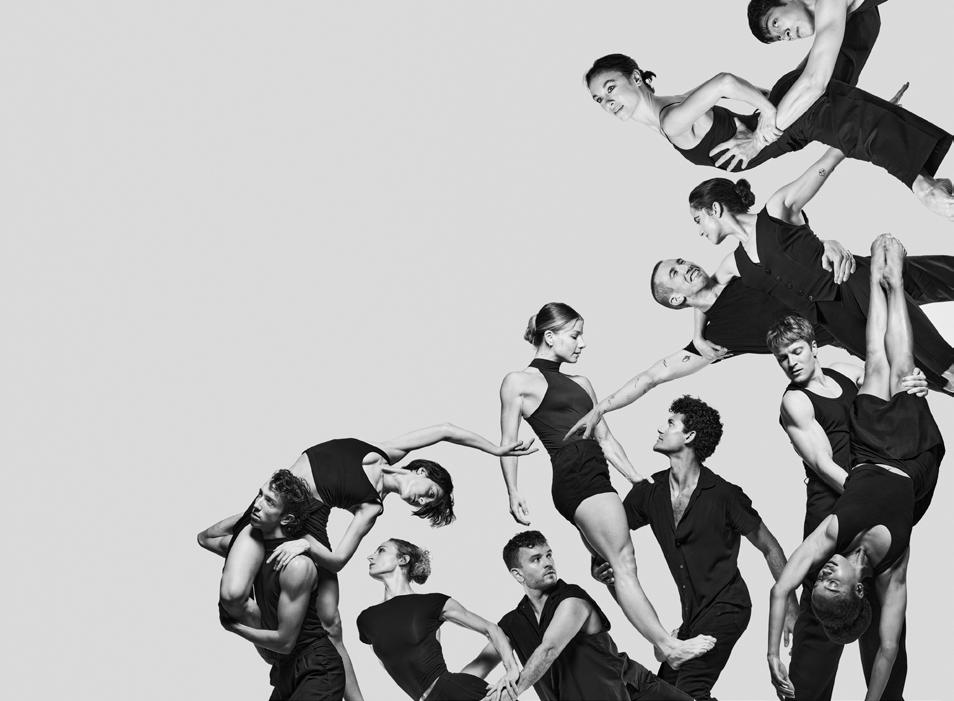
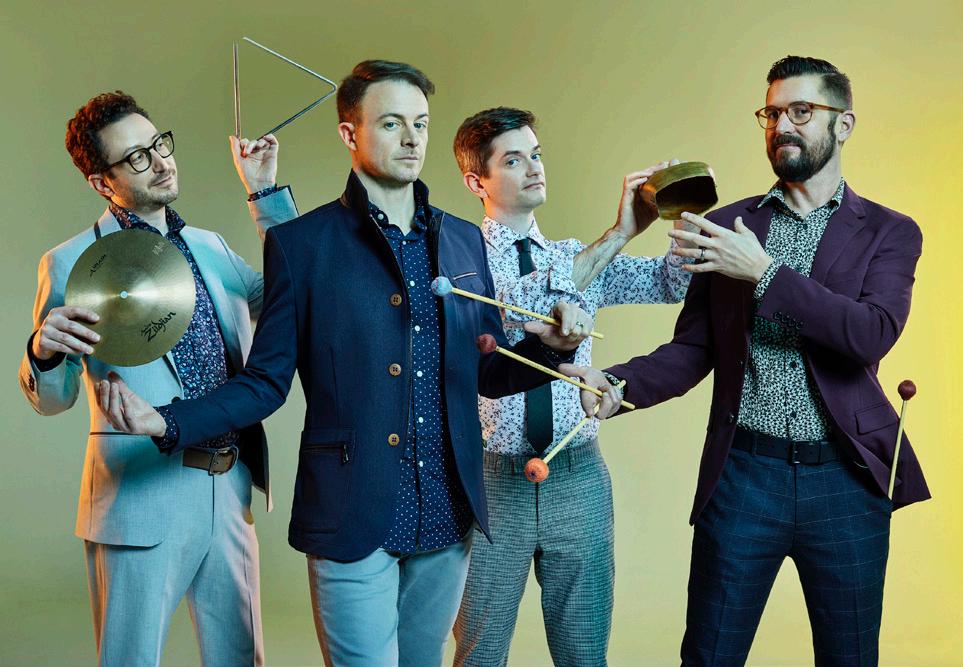
SIMONE DINNERSTEIN
Fri 11 Apr 2025
Camp Concert Hall
THE WASHINGTON POST CALLS AMERICAN PIANIST SIMONE DINNERSTEIN “AN ARTIST OF STRIKINGLY ORIGINAL IDEAS AND IRREFUTABLE INTEGRITY.” THIS SPELLBINDING ARTIST WILL PERFORM MUSIC RANGING FROM THE 17TH CENTURY TO THE PRESENT DAY.
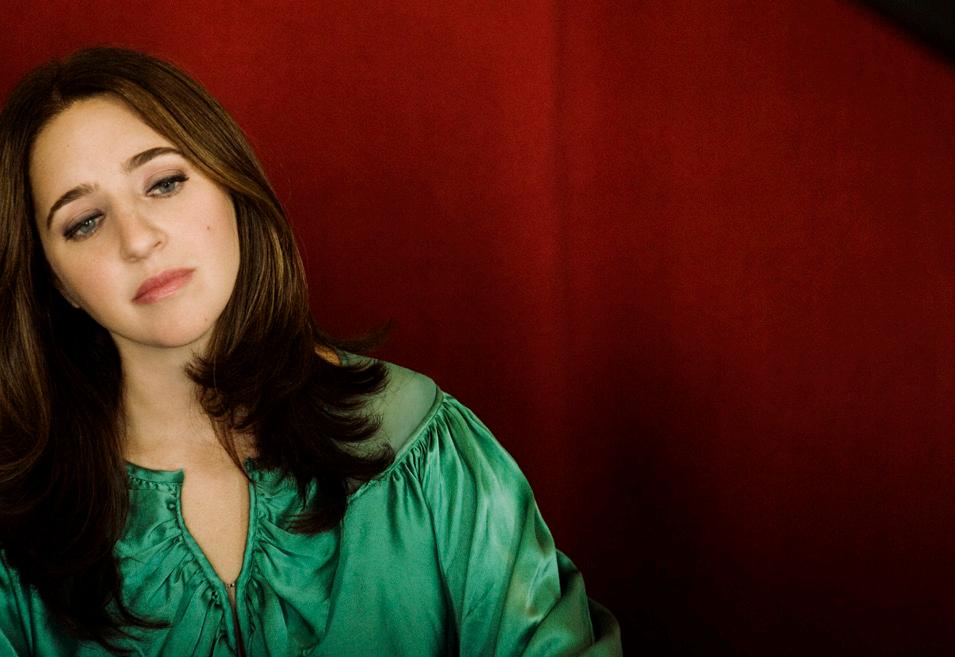
MODLIN BOX OFFICE Regular hours for window service and phone orders Monday - Friday 1pm - 5pm and 60 minutes prior to all ticketed events. Contact us at 804-289-8980 or modlinarts@richmond.edu.
TICKET POLICY All sales are final. No refunds are available, except in the event of a cancellation.
TICKET DELIVERY For all ticketed events, Modlin Center offers ticket delivery as Hold at Box Office or Mobile Tickets. When purchasing tickets that require an ID to be shown, tickets will only be available for in-person pickup at the Box Office.
TICKET DONATIONS Tickets that cannot be used, or transferred to friends of family, may be returned to the Box Office to be donated for resale. No credit will be issued.
TICKETS ARE REQUIRED All ticketed performances require every patron to have a ticket. This includes children, regardless of age. Children are welcome and must always be accompanied by an adult. Parental discretion is advised as some performances may not be suitable for young children.
PROGRAMS ARE SUBJECT TO CHANGE Events can change, sometimes without notice. In the event of a cancellation or date change, we will announce as early as possible, and attempts will be made to contact all ticket holders in advance of the performance. Help us keep you informed by ensuring your contact information is up to date.


